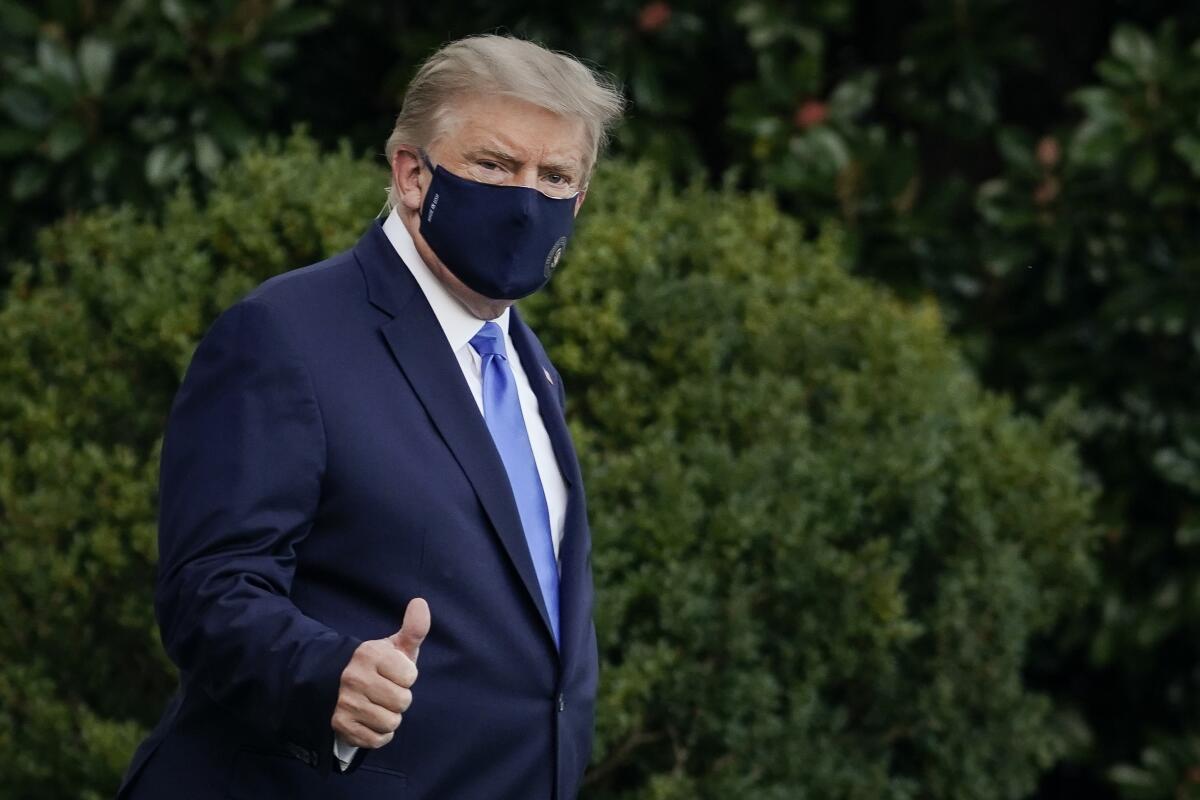Opinion: How do you feel empathy for a man who has none?

WASHINGTON — When I first learned that President Trump had contracted the novel coronavirus, I felt not an ounce of empathy.
On second thought, I felt guilty for having this knee-jerk reaction. I like to see myself as someone who cares about other people’s struggles, and can empathize with them.
After looking online, I saw that the sentiment I feared saying aloud was echoing across the internet. Neither the Twitterverse nor I was shocked that a man who had mocked the severity of the virus for months had at last succumbed to the consequences of his words and inaction.
“How could somebody who respected the pandemic so much actually get sick?” a TikTok user jokingly asked. “That is crazy. I can’t believe it.”
The memes and the callous tweets from anti-Trumpers sparked a pearl-clutching of sorts from influencers like Kanye West and Rachel Maddow, both of whom called for civility from the masses.
“God bless the president and the first lady,” Maddow tweeted. “If you pray, please pray for their speedy and complete recovery.... This virus is horrific and merciless — no one would wish its wrath on anyone.”
For some, Maddow’s sentiment was a classy tweet from a harsh Trump critic, proof that decency from the left had not been lost. For others, like Carlos Maza, it was a virtue-signaling embodiment of out-of-touch media elites who don’t know how the other half lives.
“Calls for decorum is like complaining the Titanic can get better,” Maza, a 32-year-old independent video producer, told me. “Civility would only matter if the ship wasn’t sinking. But the ship is sinking.”
By “the ship,” Maza means the American systems of power that have caused gaping inequality and harmed the most vulnerable.
We cannot blame all of America’s problems on Trump. He inherited running a country where Black people are more than three times as likely as white people to be killed during a police encounter. Where corporations and wealthy people can use loopholes to avoid paying billions in federal income taxes. And where people with diabetes are having to ration insulin — a life-saving drug whose price skyrocketed after three pharmaceutical companies that dominate the market raised their prices roughly around the same time.
No, Trump did not create these problems. But he has repeatedly retweeted white supremacists and anti-Semitic conspiracy theories, emboldening a segment of this country in ways that are horrifyingly reminiscent of our dark past. His policy of separating migrant children from their parents at the border is inhumane and will likely leave lasting trauma in the psyches of those involved. His cavalier and dismissive attitude toward mask-wearing and social distancing, and his mismanagement of the testing and tracing necessary to get this pandemic under control, have left the nation woefully unprepared. The death toll from the pandemic — 210,000 and counting — has been a disaster of epic proportions, with the United States, Brazil and India leading the world in loss of life and suffering.
So for some, Trump and his allies contracting the virus is a “tiny glimpse that those in power are just as vulnerable as we are” and a sign that the universe’s justice wheel is catching up to a man who’s tried to divorce himself from the consequences of his horrific actions, Maza told me.
“People don’t wish for death because they’re having a bad day,” Maza said. “They’re doing it because they’re hopeless about their ability to be heard.”
I feel hopeless in this current political climate. The stakes in November were already so high. But now, the Supreme Court will likely get a new conservative justice who could overturn a woman’s right to choose. That justice will have been the third appointed by a president who lost the popular vote. How am I supposed to remain civil and polite, in the face of a system so appallingly unfair and antidemocratic?
Matthew Feinberg, a professor at University of Toronto, told me that humans are largely “bounded in their empathy.” And while empathy is considered a good thing, having boundaries to it “actually helped us and our ancestors survive.”
“If a person, based on their past behavior, has shown themselves to be someone who will not feel empathy to you, then it makes little sense for you to feel empathy toward them,” Feinberg told me. “For many, President Trump has proven himself to be void of empathy, and therefore it is hard for them to feel empathy for him now that he is suffering.”
Feinberg added that people have difficulty reciprocating empathy for those not part of their “in-group.”
“This helps explain why many Democrats (or never-Trumpers) cannot muster any empathy for Trump’s situation,” he told me.
Feinberg also observed that people tend to view the world as a fair and just place. So when the president “who did not appear to take the risk of catching the virus seriously and even mocked those who did take it seriously, caught the virus, it fit with this notion that he got what he deserved,” Feinberg argued.
For Rob Sheridan, a 40-year-old independent artist living in Washington state, Trump did get what he deserved. And calls for civility and kindness toward leaders of a system that has been anything but that is hypocritical.
“People can do the most uncivil things in the world as long as they’re wearing a suit and tie,” Sheridan told me.
Uncivil things such as throwing paper towels at a crowd of people who just survived a hurricane in Puerto Rico, approving an oil pipeline that threatens to dirty water on Indian reservations and using taxpayer money to enrich your own businesses.
So for Sheridan, asking for politeness in the face of this type of abuse is a form of aiding the abuser.
“That creates a situation where civility becomes a free pass to commit atrocities,” he said. “We need to redefine what civility is if we’re ever going to be able to fight back against it.”
To be clear, Sheridan doesn’t think Trump is the only president who’s been uncivil. Former Presidents George W. Bush and Barack Obama authorized deadly military operations and drone strikes in the Middle East. That seems pretty uncivil to him. And to me too.
It’s time the press stopped attacking normal people, as Sheridan told me, for tweeting mean words into the abyss from their homes. Sure, their words are unkind. But so are these times. So is the president of the United States and those enabling him. In the face of such indifference, cruelty and contempt, it is no surprise people are feeling compassion fatigue.
Demanding that the most vulnerable be respectful to an administration that has not been respectful to them is not only illogical but callous.
I do hope Trump recovers — and that we end his cruel presidency through our votes.
More to Read
A cure for the common opinion
Get thought-provoking perspectives with our weekly newsletter.
You may occasionally receive promotional content from the Los Angeles Times.











